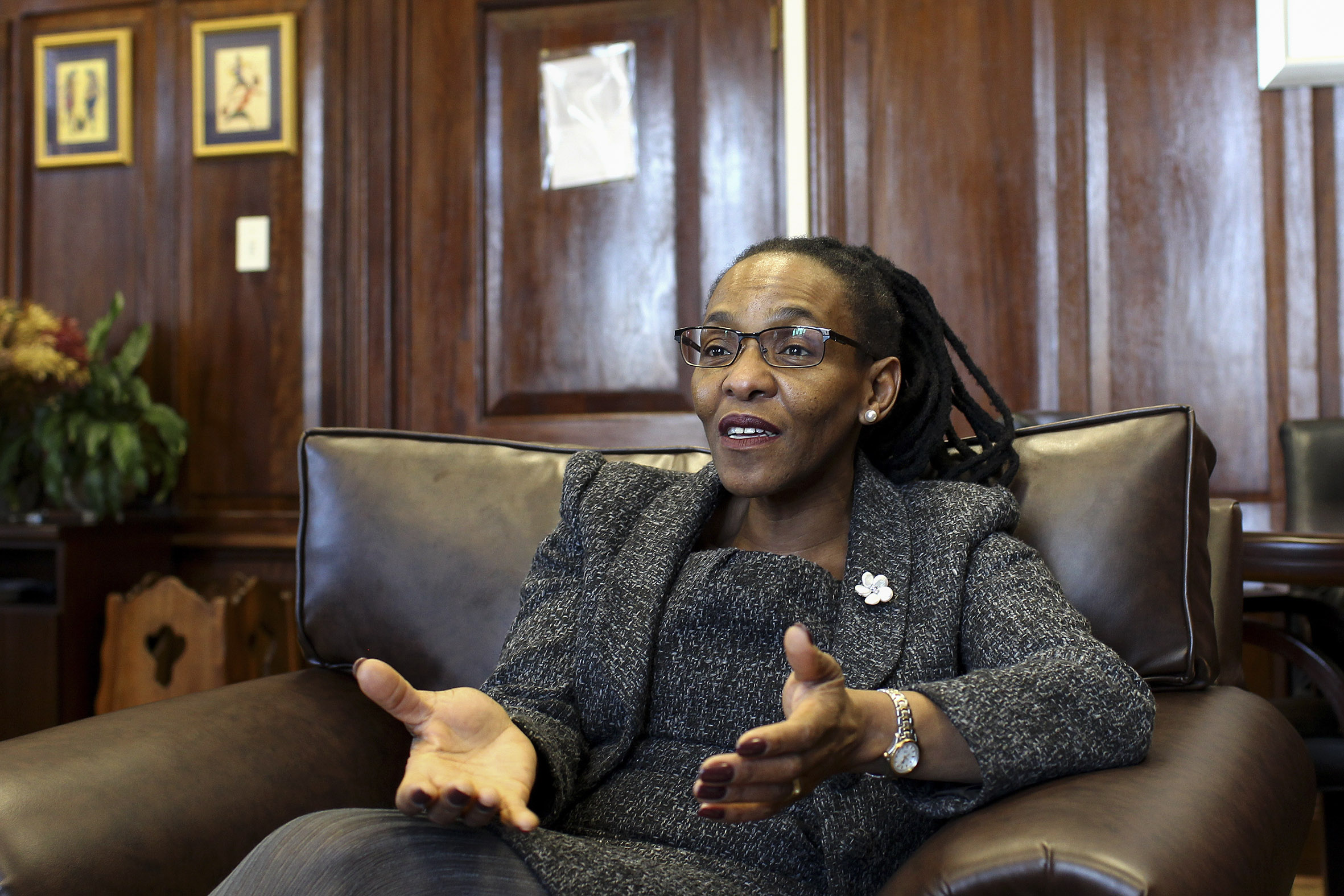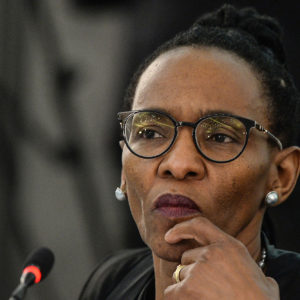‘Snakes and ladders’ for women at the JSC
Mandisa Maya’s interview for the position of chief justice overflowed with patriarchal scripts and sexual innuendo that women suffer in the workplace and society.
Author:
10 February 2022

As many across the country watched live the Judicial Service Commission (JSC) interviews for South Africa’s chief justice, patriarchy, the script of meritocracy and power intersected in public view. In the third decade of South Africa’s democracy, it seemed unspectacular that of the four presidential nominees for chief justice only one judge was a woman: Justice Mandisa Maya, president of the Supreme Court of Appeal.
The others were Constitutional Court Justice Mbuyiseli Madlanga, Gauteng Judge President Dunstan Mlambo and Acting Chief Justice Raymond Zondo. It seemed unspectacular, that is, until Commissioner Sylvia Lucas had the mettle to call it an “anomaly” and brought Maya to tears. This inconvenient, tearful moment may have startled both Lucas and Maya, but it made perfect sense for many senior professional women watching these proceedings.
For several hours before this point, and for a couple more after it, we would recognise the patterns of gaslighting, dismissal, undermining and sexual innuendos experienced in our own careers – and which we dare not respond to with visible emotion whether pain or anger.
A lesson that girls and women learn early is that patriarchy has strict rules for women’s emotions: women’s anger is always illegitimate and Black women’s tears only matter when they are for others’ pain. Lucas reminded us that Maya’s credentials were so extensive that several national and international legal bodies had supported her nomination, telling her “you have become the pallbearer for women’s aspirations”, while repeatedly underscoring the hardships and insisting that many were proud of Maya.
Related article:
Lucas’ claim that many women are proud of Maya was an effective rejoinder against the shameful ways she had been reminded that she is “just a woman” by many commissioners in her interview. In other words, there was no question of Maya’s suitability for the highest judicial office in the land. Lucas was underscoring the litany of forms of evidence that Maya herself had presented. You do not become a legal giant like Maya and muck about when it comes to evidence.
Later in the interview, an exasperated Commissioner Mvuzo Notyesi would further amplify Maya’s impeccable credentials across 640 court judgements, legal reports and jurisprudence and point to concrete evidence of her superlative work on transformation across different measures.
Yet, in a context where women’s leadership is always under question, meritocratic promise collides with toxic masculinity in an attempt to cut down even the most exceptional achievers.
The traps of meritocracy
In Against Meritocracy: Culture, Power and the Myths of Mobility, British feminist scholar Jo Littler adopts the metaphor of “ladders and snakes” to highlight the traps of meritocracy. Meritocracy “entails the idea that whatever your social position at birth, society ought to offer enough opportunity and mobility for ‘talent’ to combine with ‘effort’ in order to ‘rise to the top’”.
The ladders ostensibly offer further and further escape from the muck of the starting point, and ultimately enable the shattering of whatever ceilings may exist. Whereas the place that “ladders” and “glass ceilings” is everywhere in public discourse about achievement, Littler also draws attention to the work of the metaphoric “snakes”, or less spoken-of perils of meritocratic thinking.
There was much to illustrate the “snakes” or perils of meritocracy as applied to women in Maya’s interview. To be clear, given her record on transformation, it makes sense that many questions posed to her addressed gender, women’s access and the legal profession. Commissioners Nomaswazi Shabangu-Mndawe, Doris Tsepe, Nosiviwe Mapisa-Nqakula and Bulelani Magwanishe challenged Maya on interpretation of transformation records, sexual harassment policy timelines, briefing patterns, recruitment of women, critically engaged arguments in Maya’s academic writing and the mental health of legal professionals, especially those who deal with gender-based violence cases. These commissioners obliged Maya to articulate how she would sustain the existing superlative leadership record in future leadership choices.
Related article:
As is to be expected, many commissioners quizzed Maya in the expected manner of job interviews. Yet too many commissioners abdicated this responsibility to remind Maya that they would only engage her as a woman through sexual innuendo, made demands she speak for women leaders with no relevant connection to her and gave gratuitous reminders that she was a woman.
Defenders of Commissioner Dali Mpofu’s shocking sexual innuendo where he paused after suggesting he had once spent the night with Maya, before revealing the night was spent studying, argue that it was a poor attempt at humour. More attentive observers will see the connection between the absence of a sexual harassment policy for the legal fraternity and the permissiveness of the sexual “joke” at Maya’s expense. Mpofu is intelligent enough to know that sexualising women at work makes women uncomfortable, at best, and undermines serious treatment, at worst.
Earlier than this, Mpofu had joined Commissioner Julius Malema, in tangential tirade, on the shortcomings of specific women leaders in banking and higher education who were found disloyal to women’s interests because of inability to provide sanitary pads to poor women students. By this point in the interview, Maya had reiterated her own record, one which is in the public domain, several times.
It is a small hop from measuring women leaders of institutions by provision of sanitary protection to sexual innuendo at the expense of a woman whose record you cannot similarly dismiss. I was reminded of a One in Nine Campaign poster: “Women are not just faces and vaginas.”
Trivialising women’s leadership
The third category of troubling gender performance fell into the category Maya had explicitly labelled as patronising, “well intentioned”, patriarchal trivialisation of women’s leadership.
Minister of Justice Lamola set the tone with, “I got the impression that you are standing on your own credentials, and not on the basis that you are a woman.” When Maya responded, “I’m a judge. I’ve proven myself over 22 years. I’m not good because I am a woman; I’m just a good woman judge,” he dismissed what she was really saying with the retort, “I wanted you to say it.”
Up next, Judge President Pule Tlaletsi asked the woman who holds the second highest judicial office in the country whether she was worthy of one step up, thus: “Is South Africa ready for the appointment of a woman chief justice?” Linking back to her comments on “well-intentioned”, patriarchal comments, Maya responded: “I appreciate the sentiment behind the question, but I don’t think it’s a proper question to ask because it implies all sorts of negative things. But the short answer is: South Africa has always been ready to have a woman chief justice.”
Importantly, she continued, “That question annoys a lot of women. I’ve had people say, ‘Was it ever asked if South Africa is ready for a Black chief justice and if not, why not? Why are we asking this about women?” Yet, Commissioner China Dodovu would also pipe up: “I am trying to think of a woman who has risen to such majestic heights of success like you. I’m very much impressed, I must say and I very much hope that young women of this country will look at you, try to emulate your examples and vision which is very important in the context of our country”. This is a classic patronising patriarchal comment parading as a well-intentioned one.
Related article:
Not to be outdone, Commissioner Narend Singh would speak about his disappointment that the president of the country ignored a previous round of recommendations of “very capable women” by the JSC. “Do you have a view on that? Do you want to express a view? Because I certainly was very disappointed.”
Some of these were followed by serious questions. Others appeared to function merely as grandstanding. At different points, commissioners could barely disguise the irritation at the ways in which toxic masculinity was on full display in Maya’s interview, however. Evidence of this ranged from Malema questioning Commissioner Tlaletse’s mansplaining, and refutation of an often-circulated claim about men being overlooked in favour of women, to Commissioner Notyesi using his time on the floor to rehearse a litany of achievements. Notyesi was no doubt fatigued by the constant questioning of what was available, verifiable record. Malema’s interventions in Maya’s interview twice pushed back against strategies of dismissing women’s work, and reinscribed another.
For women who have been the first, the only or among a handful to enter senior echelons, it made sense that Lucas’ gentle acknowledgement and recognition allowed Maya’s fatigue to bubble to the surface. At a time where public discourse is saturated with appeals to celebrate women’s leadership as inevitable, there is too little time spent on what makes it so rare, and the toxicity that is a normalised part of that experience. The perils were on full display in Maya’s interview.



